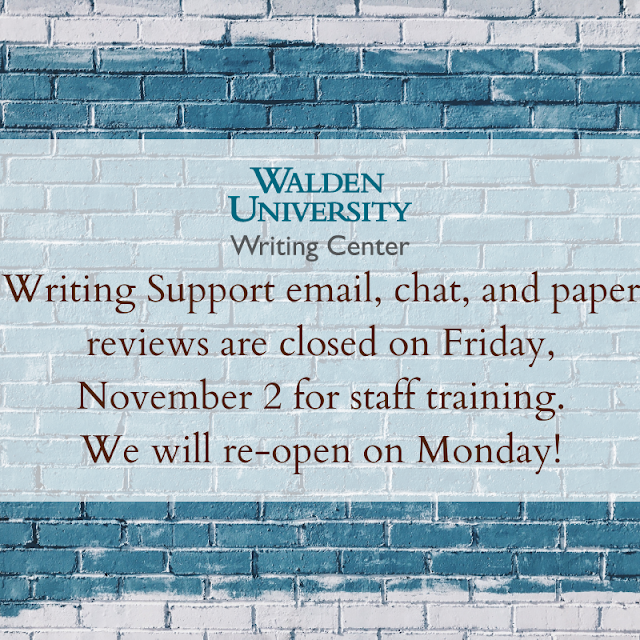Update on Writing Center Services for Friday, November 2nd, 2018
The Walden Writing Center's Writing Support email, chat, and paper review services are closed on Friday, November 2nd, 2018 for staff training. We will reopen on Monday! If you're looking for writing support in the meantime, check out the writing resources on our website.
Thank you to all our readers. We are very excited to return on Monday even better-prepared to support your writing journey here at Walden University!

The Walden University Writing Center supports writers at all stages of their degree programs and writing processes. Walden University students are encouraged to participate and practice their scholarly writing skills with one of our instructors or editors.
.png)
Never miss a new post; Opt-out at any time
Thank you to all our readers. We are very excited to return on Monday even better-prepared to support your writing journey here at Walden University!

The Walden University Writing Center supports writers at all stages of their degree programs and writing processes. Walden University students are encouraged to participate and practice their scholarly writing skills with one of our instructors or editors.
.png)
Never miss a new post; Opt-out at any time
How Rubrics Fit Into Your Writing Process
Many course assignments at Walden University include grading
rubrics. Rubrics are different than the assignment prompt itself—a rubric
describes traits the final work should have, whereas the assignment prompt
describes the content. The Writing Center has some great
resources on using your assignment prompt effectively that you can review,
but today I’ll focus more on those grading rubrics and how they can fit into
your writing process.
A grading rubric describes various areas of your work and
what would achieve success in those areas. For example, a rubric section on organization
might have various descriptions like “ideas are well-organized and clearly
explained”. These descriptors may be a little confusing or hard to puzzle out
as you’re writing your draft itself. So, I suggest reviewing your rubric before
you write your first draft to get an idea what components of your work are most
important for that assignment, then I suggest putting your rubric aside and
focusing on the assignment and the writing itself. Once you’ve written your
draft and checked that you’ve completed all of the important content components
from the assignment prompt, then might be a good time to work your rubric back
into your writing process.
One important thing to consider about rubrics is that,
ultimately, what aspects in your work add up to what score is up to your
faculty. That means that you shouldn’t stress too much about the rubric as
you’re writing and as you look back over your work—especially at the start of a
course. However, your rubric can be a great tool for revision of an individual
paper.
Here are my overall tips for using your paper assignment’s
rubric at different stages of the writing process:
Before You Turn in Your Draft
1. Read over your rubric after you finish a polished draft of
your work that you believe meets the components of the assignment.
2. Consider if you think you are accomplishing the descriptions
in the rubric (again, it might be hard to know at this stage—but give it a once
over as part of your polishing up process).
3. If there’s an area you think is lacking, try revising on
your own, review some of our resources, or make a Writing Center paper review appointment if you have time before the assignment is
due.
After You Have Your Grade
1. Take a look at which areas of your rubric most needed
work—maybe it’s organization, grammar, APA, or another category. Read the
description of the area where you scored lower than you’d like to, then read
the area in the next point category up.
2. Review your draft and consider how you might fit the
description area you were scored for and also any ideas you have for ways to
move up to the next point area.
3. Try revising a bit on your own, or come to the Writing
Center for a paper review appointment. Only your faculty knows for certain why
they gave you a particular grade, but we’ll do our best to focus on that
category and suggestions to help you enhance that aspect of your writing.
4. Keep this paper review in mind as you write your next draft
and work on applying similar skills.
Throughout the Semester and Beyond
1. Rubrics and areas where you score higher or lower aren’t
just valuable for individual assignments, you can keep track of your score
areas to work towards building a writing goal.
2. From draft to draft, you can pay attention to areas you
scored lower or higher on previously and keep track on your own of what aspects
of your writing you’d like to work on being more consistent.
3. Come to the Writing Center with your goal in mind and we’ll
focus specifically on that area of your writing with you to assist you in
working towards advancing your skills as well as working to meet whatever your
rubric scores have indicated is a good area to focus on.
Remember, a rubric is just another tool to help you set some
writing goals, use the Writing Center and some of the strategies above to work
on achieving your goals!
Claire Helakoski is a writing instructor at the Walden Writing Center. Claire also co-hosts WriteCast, the Writing Center's podcast. Through these multi-modal avenues, Claire delivers innovative and inspiring writing instruction to Walden students around the world.
.png)
Never miss a new post; Opt-out at any time
November Webinar Schedule
This month, we have exciting webinars on both the beginning and end of the writing process. We are also featuring thesis statements and citations. Join us!
What About Me? Using Personal Experience in Academic WritingWednesday, October 31, 2018
12:00 pm - 1:00 pm Eastern Time
How and When to Include APA Citations
Tuesday, November 6, 2018
8:00 pm - 9:00 pm Eastern Time
Practical Writing Skills: Writing Strong Thesis Statements
Wednesday, November 14, 2018
7:00 pm - 8:00 pm Eastern Time
Prewriting Techniques: Taking the First Steps
Tuesday, November 20, 2018
12:00 pm - 1:00 pm Eastern Time
Improving Your Writing: Strategies for Revising, Proofing, and Using Feedback
Wednesday, November 28, 2018
3:00 pm - 4:00 pm Eastern Time
Can't make it to one of our live webinars? No worries! We record all of our webinars and publish them in our webinar archive for you to view at your convenience.

The Walden University Writing Center produces a live webinar each and every week. Walden University students are encouraged to participate and practice their scholarly writing skills with one of our instructors or editors.
.png)
Never miss a new post; Opt-out at any time
APA Style Refresh: Choosing the Right Verb Tense
Join us for our blog feature where we give readers, students, and scholarly writers an APA Refresh. These posts will help you to understand common (and not-so-common) APA rules, guidelines, and style considerations. We hope you find them informative and helpful. Just like a cold beverage on a hot, hot day, you'll definitely enjoy this APA Refresh!
One element of writing style that varies across the different citation styles (APA, MLA, Chicago, etc.) is the use of verb tenses to discuss source material and results. As you revise your writing, you’ll want to make sure that your choice of verb tense aligns with APA Style’s recommendations.
If you are discussing sources from your literature review or your procedure if it took place in the past, you can choose to use either the past tense or the present perfect tense:
Olson discovered
Researchers have found
If you are describing the results of a study, you should use the past tense to indicate that the study has already taken place:
Student performance improved
When you discuss and analyze your results and present your conclusions, you should use the present tense. This invites your readers to join you in considering the results and conclusions:
These results indicate
In any case, be sure to use the chosen verb tense consistently throughout a passage. This will ensure that your writing moves along smoothly rather than surprising your reader with abrupt changes in verb tense.
Do you have questions about which verb tense to use in a particular situation? Ask them in the comments below.

Cheryl Read is a Writing Instructor in the Walden University Writing Center who seems to learn something new about APA Style just about every week. When she’s not helping student writers at Walden, Cheryl stays busy playing with her son and working on her dissertation.
.png)
Never miss a new post; Opt-out at any time
Thursday Thoughts: Global Days of Service 2018
Every year, Walden University celebrates Global Days of Service. Here in the Walden Writing Center, we participate by volunteering and sharing resources related to positive social change. This year, we have even initiated paper reviews for social change. As a scholar practitioner, you play a role in creating change in your field and society.
To honor this year's Global Days of Service, here are a collection of some of our favorite service-minded resources:
Social Change and Difficult Conversations: In this WriteCast episode, writing instructors talk about the importance in having a space in which to hold difficult conversations, as that is where social change takes place and is developed.
Using Restorative Writing to Enact Social Change: The Walden Writing Center hosts a series of webinars related to positive social change, and as you check out the archive be sure to pay attention to this newest webinar. New to restorative writing? We walk you through it and show how it can be a part of positive social change.
Creative Writing for Social Change: The Academic Skills Center also hosted a webinar looking at how writing can lead to social change. This recorded webinar looks at creative writing and the literary history of social change.
Student Spotlight Series: Here on the blog we like to highlight the wonderful work of our students, both in their coursework and in society. Start with this post about Jessica Meadows, a student in the College of Education, and then use the "Student Spotlight" tag in our blog to find more inspiring stories.
Social Change at the Writing Center: This page is a hub for the social change efforts of everyone here at the Walden Writing Center.
To honor this year's Global Days of Service, here are a collection of some of our favorite service-minded resources:
Social Change and Difficult Conversations: In this WriteCast episode, writing instructors talk about the importance in having a space in which to hold difficult conversations, as that is where social change takes place and is developed.
Using Restorative Writing to Enact Social Change: The Walden Writing Center hosts a series of webinars related to positive social change, and as you check out the archive be sure to pay attention to this newest webinar. New to restorative writing? We walk you through it and show how it can be a part of positive social change.
Creative Writing for Social Change: The Academic Skills Center also hosted a webinar looking at how writing can lead to social change. This recorded webinar looks at creative writing and the literary history of social change.
Student Spotlight Series: Here on the blog we like to highlight the wonderful work of our students, both in their coursework and in society. Start with this post about Jessica Meadows, a student in the College of Education, and then use the "Student Spotlight" tag in our blog to find more inspiring stories.
Social Change at the Writing Center: This page is a hub for the social change efforts of everyone here at the Walden Writing Center.
.png)
Never miss a new post; Opt-out at any time
Subscribe to:
Posts
(
Atom
)








